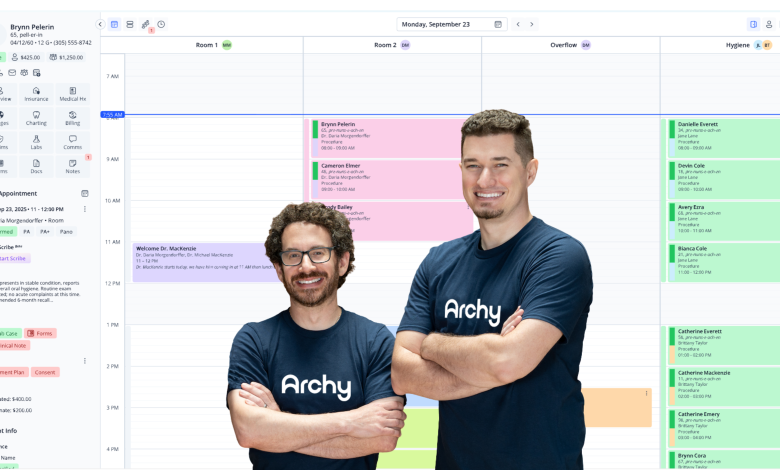
Dentists have long been overlooked by tech providers who have focused on the larger healthtech market. The result is offices forced to use 20-40 year old software that consistently breaks and requires physical servers in the closet.
To solve this, Archy today raised $20 million in Series B funding led by TCV, with participation from Bessemer Venture Partners, CRV, Entrée Capital, and 25 practicing dentists.
Archy’s pitch is simple: replace the patchwork of practice-management, imaging, billing, claims, communications, and payments tools with one secure, cloud system, and layer in AI to do the busywork. The startup says its platform is already processing more than $100 million in payments annually and that customers save about 80 hours a month through automation. The company says its planning to use the new funding to hire across engineering, AI, and go-to-market.
Why it matters
Many dental offices still run on aging, disconnected systems, and on local servers that go down at bad times. Staffing is thin and turnover is high, which makes retraining across multiple tools expensive and error-prone. Benefits checks, claims follow-ups, statement reminders, and schedule management soak up hours that could be spent on patients. The outcome: denied claims, missed revenue, and burnout.
“Dental practices are getting squeezed from every direction, there’s a massive staffing shortage, hiring costs keep climbing, and insurance reimbursements keep falling,” said Jonathan Rat, founder and CEO of Archy. “We’re not just building software; we’re building an AI-powered teammate that helps practices do more with smaller teams, turning the staffing crisis into a competitive advantage.”
What Archy does
Archy is a single platform for scheduling, charting, imaging, billing, insurance, payments, messaging, and reporting. It runs in the cloud with automatic updates, backups, and role-based access, so administrators can manage multi-site groups and cover staffing gaps. The company says the interface is simple enough to onboard non-dental hires quickly.
Under the hood are AI agents aimed at the most time-consuming front-office and revenue tasks:
- Archy Verify checks insurance and eligibility.
- Archy Revenue files claims, chases collections, and sends bills.
- Archy Scribe drafts clinical notes and follow-ups in real time.
- Archy Connect handles patient communications and scheduling.
- Archy Insight turns practice data into plain-language answers and growth ideas.
Archy claims these agents reduce manual work, improve claim acceptance, and stabilize cash flow, especially for offices juggling multiple systems or locations.
A customer view
The switching cost is real for any practice. Thomas DeChellis, DDS, owner of DeChellis & Stonestreet Dentistry, says his offices used Dentrix for 35 years and Dexis for 17 before moving. “Archy makes it simple to manage multiple offices in one platform, from x-rays to charting to patient communications and billing,” he says. According to DeChellis, training ranged from 1-2 days for team members from ages 20 to 68, and the change saved over $50,000 in year-one hardware and IT costs.
A husband and wife founder story
Rat is a former product manager at Meta, Uber, and SurveyMonkey. He started Archy after watching his wife, a dentist, struggle to deploy, maintain, and upgrade IT across her practice. Nights and weekends on hold with third-party vendors exposed brittle workflows and hidden costs. Rat teamed up with Benjamin Kolin, now CTO, who previously held senior engineering roles at Uber, VMware, and Yahoo. Archy was founded in 2021.
Traction and growth
Archy says it serves practices in 45 states, is growing 300% year over year, and has now raised $47 million to date. The revenue model blends software subscriptions with payments and revenue-cycle features; the company did not disclose pricing.
For backers like TCV, the bet is that vertical software consolidation, plus practical AI, can lift margins in a fragmented, services-heavy market. “Beyond just bringing customers to the cloud, Archy enables dental offices to do more with less via its novel intelligence, automation, and ease of use,” says Austin Levitt of TCV. “The Archy team combines engineering excellence with empathy for dentists, positioning them to reimagine the way the industry works in the AI age.”
What’s next
With new capital, Archy plans to expand its AI agents, deepen imaging and charts, and grow sales and support. The company also hints at features that let lean teams cover more hours across locations, useful for groups consolidating smaller practices.
The broader trend is clear: healthcare specialties are moving from on-prem, multi-vendor stacks to cloud platforms with embedded automation. In dentistry, where margins are tight and staffing is tough, a product that cuts hours of manual work each week is an easy story to test. The question now is how fast practices are willing to switch, and whether AI can stay reliable when revenue depends on it.
Interested employees and dental practices can learn more at https://archy.com/.



